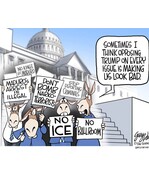
Robert Maynard
Tea party focus
By Robert Maynard
There has recently been talk within the Tea Party movement on whether to maintain a focus on "fiscal issues," rather than take on the "social issues." Arguments for both sides have been put forward. On the one side is the argument that you stick with what brought you success rather than divide the movement. The opposing argument mostly makes the point that the restoration of America's constitutional republic requires more than a "materialistic" focus on economics.
Both sides make the mistake of separating economic and social concerns. The cornerstone of the social order is the family and social endeavors are somehow related to family affairs. A key aspect of that social order is tied to economics. Like the ancient Greeks, the early Americans did not see economics as something separate from family issues.
According to the entry under economy in the "Online Etymology Dictionary" The term economics comes from the Ancient Greek οἰκονομία (oikonomia, "management of a household, administration") from οἶκος (oikos, "house") + νόμος (nomos, "custom" or "law"), hence "rules of the house(hold)." In other words, the discipline of economics had its origin in the family unit.
Austrian Economist Ludwig Von Mises carried on this understanding in modern times. In an economic treatise entitled "Socialism," which critiqued a command and control economic system, Von Mises dedicated a whole chapter to the family. Von Mises saw the family, like private property, as a natural part of the social order stemming from human nature. In his view, command and control approaches to economics were utopian attempts to socially engineer human nature. Such approaches sought to undermine both the family and the free market, as they were seen as an obstacle to the socially engineered society.
This was essentially the same conclusion that early Americans came to. Most people are aware that the writings of Adam Smith, who published the "An Enquiry into the Wealth of Nations" in 1776, had an impact on American economic thinking. Smith is best known for his economic conclusions, but he was a moral philosopher and his economic conclusion flowed from his moral concerns.
I think that most Tea Party members intuitively understand this. The main issue that brought them out to protest was run away spending. When you look at the bulk of the literature produced by the movement, it does not phrase this concern mostly in fiscal terms. The concern is expressed in terms of violating the constitutional limits on the proper role of government. For them the limited government issue transcends the artificial fiscal/social issue divide. Expanding the role of government has fiscal issue implications, as it is expensive. At the same time, it has social issue implications as expanding government's role crowds out the institutions of Civil Society like the family and Church. Indeed, one could easily make the argument that the undermining of the functions of such institutions by the ever-expanding role of government is among the most serious social issues we face. The expansion of the role of government certainly is at the heart of our most serious fiscal issues as it generates excessive spending, taxation and regulation.
The central political concern that is expressed in our Declaration of Independence and Constitution is the proper role of government. This concern has both fiscal and social issue implications, but transcends both. It is also the animating behind the Tea Party movement.
Many of the movement's leaders are new to political activism and were drawn to the movement by concern for the future of their children. Such concerns can hardly said to be materialistic. The problem is not with the Tea Party movement's focus, it is with narrowly understanding it.
© Robert Maynard
August 17, 2010
There has recently been talk within the Tea Party movement on whether to maintain a focus on "fiscal issues," rather than take on the "social issues." Arguments for both sides have been put forward. On the one side is the argument that you stick with what brought you success rather than divide the movement. The opposing argument mostly makes the point that the restoration of America's constitutional republic requires more than a "materialistic" focus on economics.
Both sides make the mistake of separating economic and social concerns. The cornerstone of the social order is the family and social endeavors are somehow related to family affairs. A key aspect of that social order is tied to economics. Like the ancient Greeks, the early Americans did not see economics as something separate from family issues.
According to the entry under economy in the "Online Etymology Dictionary" The term economics comes from the Ancient Greek οἰκονομία (oikonomia, "management of a household, administration") from οἶκος (oikos, "house") + νόμος (nomos, "custom" or "law"), hence "rules of the house(hold)." In other words, the discipline of economics had its origin in the family unit.
Austrian Economist Ludwig Von Mises carried on this understanding in modern times. In an economic treatise entitled "Socialism," which critiqued a command and control economic system, Von Mises dedicated a whole chapter to the family. Von Mises saw the family, like private property, as a natural part of the social order stemming from human nature. In his view, command and control approaches to economics were utopian attempts to socially engineer human nature. Such approaches sought to undermine both the family and the free market, as they were seen as an obstacle to the socially engineered society.
This was essentially the same conclusion that early Americans came to. Most people are aware that the writings of Adam Smith, who published the "An Enquiry into the Wealth of Nations" in 1776, had an impact on American economic thinking. Smith is best known for his economic conclusions, but he was a moral philosopher and his economic conclusion flowed from his moral concerns.
I think that most Tea Party members intuitively understand this. The main issue that brought them out to protest was run away spending. When you look at the bulk of the literature produced by the movement, it does not phrase this concern mostly in fiscal terms. The concern is expressed in terms of violating the constitutional limits on the proper role of government. For them the limited government issue transcends the artificial fiscal/social issue divide. Expanding the role of government has fiscal issue implications, as it is expensive. At the same time, it has social issue implications as expanding government's role crowds out the institutions of Civil Society like the family and Church. Indeed, one could easily make the argument that the undermining of the functions of such institutions by the ever-expanding role of government is among the most serious social issues we face. The expansion of the role of government certainly is at the heart of our most serious fiscal issues as it generates excessive spending, taxation and regulation.
The central political concern that is expressed in our Declaration of Independence and Constitution is the proper role of government. This concern has both fiscal and social issue implications, but transcends both. It is also the animating behind the Tea Party movement.
Many of the movement's leaders are new to political activism and were drawn to the movement by concern for the future of their children. Such concerns can hardly said to be materialistic. The problem is not with the Tea Party movement's focus, it is with narrowly understanding it.
© Robert Maynard
The views expressed by RenewAmerica columnists are their own and do not necessarily reflect the position of RenewAmerica or its affiliates.
(See RenewAmerica's publishing standards.)



















